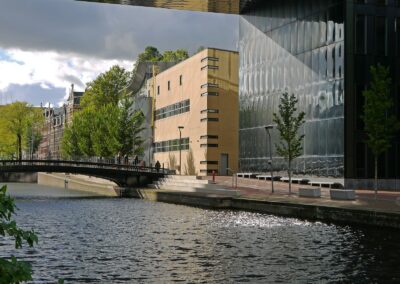Harnessing Big Data through Public-Private Partnerships
Collaborative Approaches to Urban Planning
Public-Private Partnerships (PPPs) play a pivotal role in leveraging big data for urban planning and development, particularly in rapidly growing cities such as Riyadh and Dubai. By combining the resources and expertise of both sectors, these partnerships can drive significant advancements in urban infrastructure and services. The integration of big data into urban planning enables more informed decision-making and the creation of smarter, more efficient cities.
In Saudi Arabia, PPPs have been instrumental in various urban development projects. By partnering with private companies, the government can access advanced technologies and analytical tools that enhance urban planning efforts. For instance, big data analytics allows for the analysis of traffic patterns, population demographics, and environmental factors, providing a comprehensive understanding of urban dynamics. This data-driven approach helps planners design infrastructure that meets the current and future needs of the population, ensuring sustainable urban growth.
Similarly, in Dubai, PPPs are a cornerstone of the city’s ambitious smart city initiatives. The collaboration between public entities and private tech firms facilitates the implementation of cutting-edge solutions in transportation, energy management, and public services. By leveraging big data, these partnerships can optimize resource allocation, improve service delivery, and enhance the overall quality of life for residents. The data collected from various sources is used to develop predictive models that help anticipate and mitigate urban challenges, making Dubai a model of modern urban planning.
Enhancing Urban Development with Emerging Technologies
The role of Public-Private Partnerships in Leveraging Big Data for Urban Planning is further amplified by the integration of emerging technologies such as Artificial Intelligence (AI), Blockchain, and the Metaverse. These technologies provide additional layers of sophistication to urban planning processes, enabling more precise and efficient management of urban environments.
AI and machine learning algorithms can analyze vast amounts of data to identify patterns and trends that inform urban planning decisions. In Riyadh, for example, AI-powered analytics can help optimize traffic flow, reduce congestion, and improve public transportation systems. By predicting traffic patterns and identifying potential bottlenecks, AI enables planners to develop strategies that enhance mobility and reduce travel times. This not only improves the daily lives of residents but also boosts economic productivity by minimizing delays and inefficiencies.
Blockchain technology offers a secure and transparent platform for managing urban data. In Dubai, blockchain is used to ensure the integrity and authenticity of data collected from various urban systems. This technology enhances trust among stakeholders by providing a tamper-proof record of transactions and data exchanges. The secure sharing of data between public and private entities facilitates better collaboration and more effective urban planning. Blockchain also supports the creation of decentralized smart contracts that automate various aspects of urban management, further streamlining operations and improving efficiency.
The Metaverse, a virtual environment that simulates real-world scenarios, provides a powerful tool for urban planners. By creating virtual models of cities, planners can test and refine their strategies before implementing them in the real world. This approach allows for the exploration of different development scenarios and the identification of potential issues in a risk-free environment. In cities like Riyadh and Dubai, the Metaverse enables planners to visualize the impact of new projects on the urban landscape and make data-driven adjustments that optimize outcomes.
Leadership and Management in Public-Private Partnerships
Effective leadership and management are crucial for the success of Public-Private Partnerships in Leveraging Big Data for Urban Planning. Business executives and mid-level managers in Saudi Arabia and the UAE must possess the skills to navigate the complexities of these partnerships and drive successful outcomes. Executive coaching services play a vital role in developing these skills, ensuring that leaders are equipped to manage change and foster innovation.
Leadership in this context involves building strong relationships between public and private entities. Managers must be adept at facilitating collaboration and ensuring that all stakeholders are aligned in their goals and strategies. In Riyadh and Dubai, where large-scale urban projects are common, this kind of leadership is essential for achieving sustainable and efficient urban development. Effective communication is key, as it ensures that all parties understand their roles and responsibilities and are committed to the partnership’s success.
Project management also requires a strategic approach to integrating big data and emerging technologies into urban planning. This involves setting clear objectives, managing resources efficiently, and continuously monitoring progress to ensure that projects stay on track. In the dynamic environments of Saudi Arabia and the UAE, robust project management practices are essential for delivering high-impact urban development initiatives. By leveraging big data and emerging technologies, public-private partnerships can drive significant advancements in urban planning and create cities that are resilient, sustainable, and equipped to meet the challenges of the future.
#PublicPrivatePartnerships #BigData #UrbanPlanning #SaudiArabia #UAE #Riyadh #Dubai #AI #Blockchain #Metaverse #Leadership #ProjectManagement























